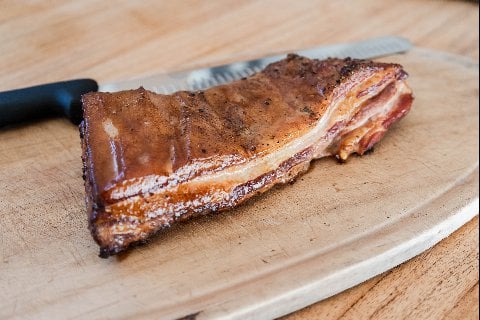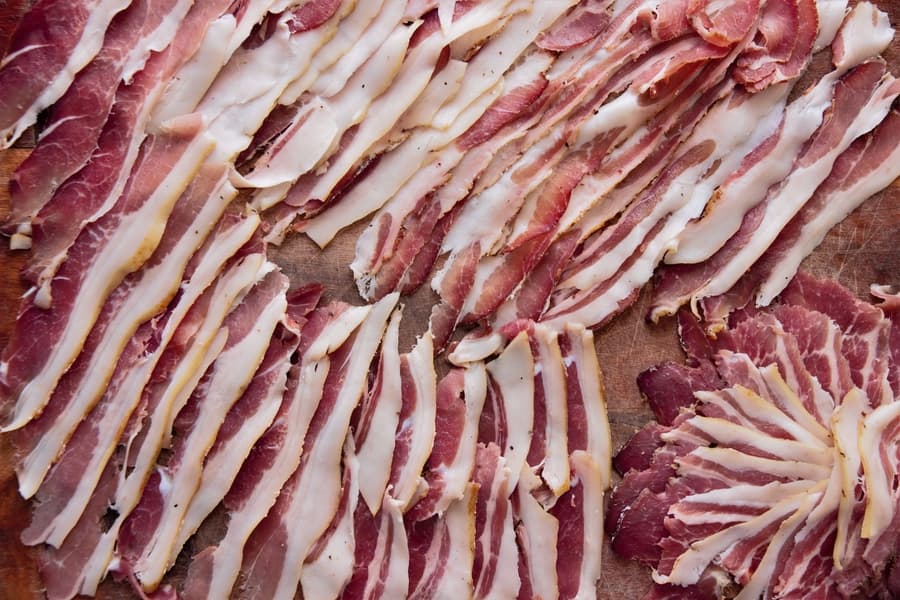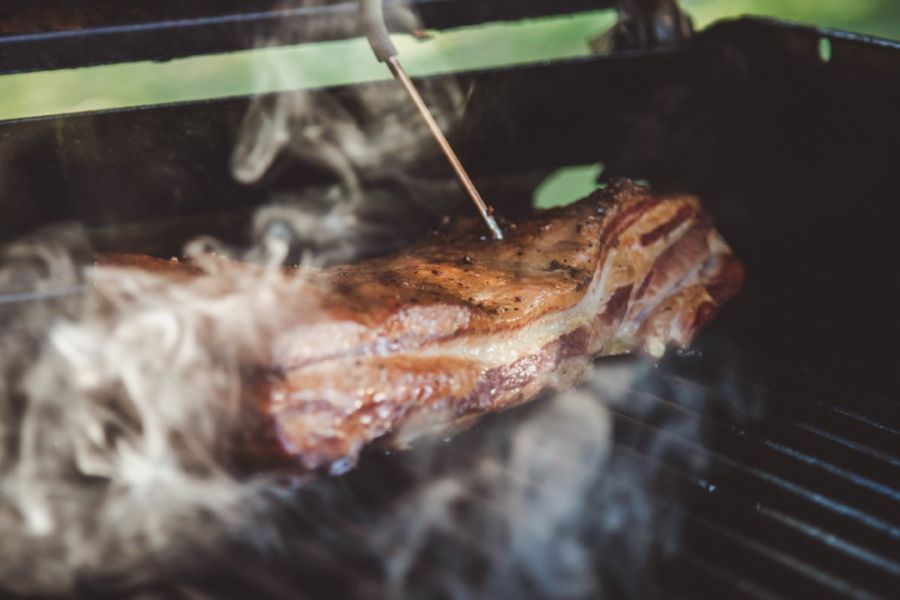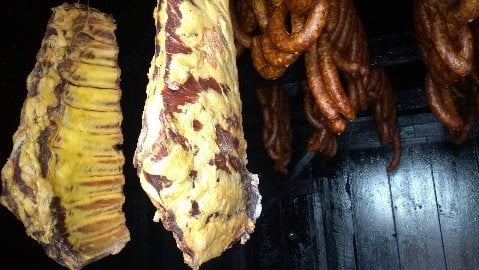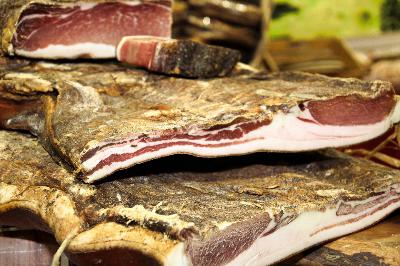Below the calculator, you’ll find information on what it does, how to use it, dry and wet curing, tips and advice, and links to relevant articles.
Here it is first, so you can bookmark this page and see it easily. Then I’ll cover the details below.
USA Bacon Curing Calculator
Used for Curing Salt No. 1 (projects needing less than 30 days to complete).
Your Bacon Cure Recipe
| Ingredient | Amount | Percentage |
|---|
Cure Time: 0 days
Based on the "Rule of Thumb": 1 day per 1/4 inch (6mm) of thickness + 2 days buffer for equilibrium curing.
This ensures adequate time for the salt and nitrite to fully penetrate the meat for safe and even curing.
What This Calculator Does
Calculates the weight of the salt as a percentage of the weight of the meat you are using for the bacon, with or without curing salt #1.
This calculator also applies to both dry and wet curing.
This method has many benefits, and the calculator makes it easy. Less salt is used, you can control the saltiness, there’s a flexible curing time, and you get consistent results.
Specifically for bacon curing, this calculator offers adjustable amounts, with some suggestions. To make it simple, I’ll include the most common quantities in a table that I and many others use for homemade bacon.
I’ll also add tips and tricks about bacon curing and smoking. I’ve written many articles on the topic, and I’ll link to them.
In the USA and many other Western countries, curing salt is added to the sea salt mixture. The calculator will include curing salt #1 (for under 30-day meat-curing projects), with or without it.
How to Use it
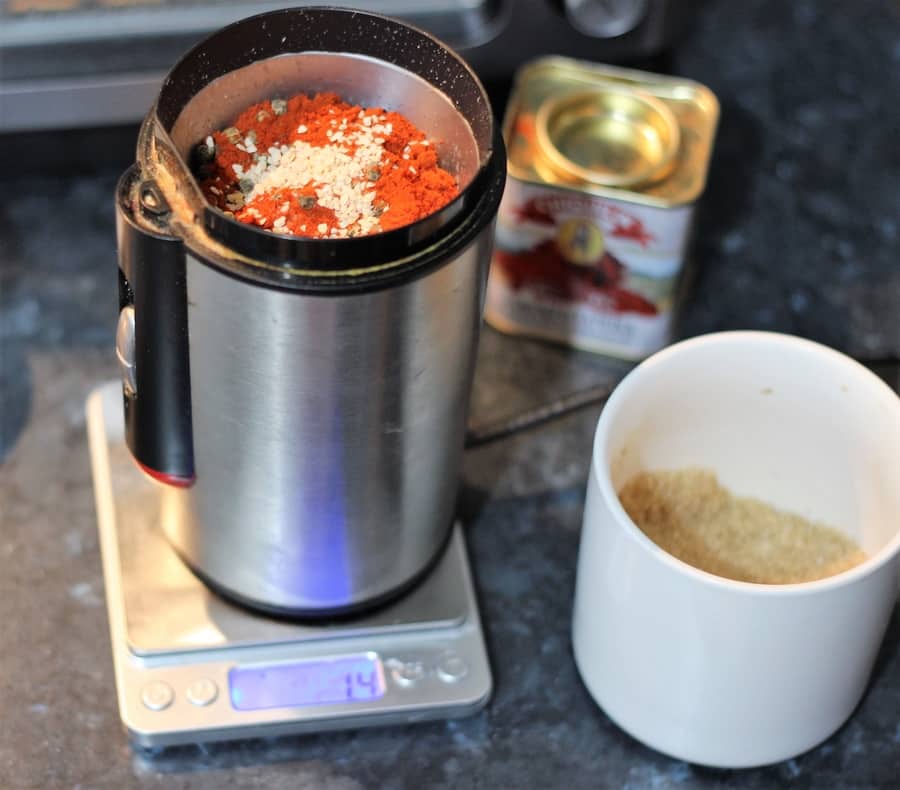
Weigh the meat you’re using for the bacon; I’ve suggested 2.25% for the total salt content. This is what I’ve used for about a decade, with numerous people finding it to their taste.
Dry Cure Method
It won’t seem like much, but it will work when ground to a fine powder in a spice grinder or mortar and pestle. Then apply it to the meat in a bowl, until it’s evenly covered. Try to get as much cure as possible into a ziplock or vacuum bag with the meat.
Inside the bag, the salt will distribute evenly throughout the meat over time, resulting in a consistent salt concentration throughout.
Key Points:
- Preference for Bacon Curing – 2.0% to 2.75% – for bacon that is not too salty
- A minimum of 2% total salt is needed
- Skin can be left on or removed before salt curing.
If you use curing salt #1 nitrite, it works out the amount based on the 0.25%, recommended amount (calculation/links below also). Since curing salt #2 is for over 30 days of meat curing projects (like pancetta or braesola) it’s not used for bacon.
Wet Brine Method
It can take a few attempts to figure out how much water you need. In the calculator, you can adjust the percentage to measure the water amount, and then use it.
Often, I’ve needed 40-50% water to submerge the meat. How tightly does the container fit the shape of the meat? The easiest way I’ve found to do this is to place the meat in your snug curing container, then add fresh, cold water until it’s submerged.
Remove the meat, and measure or weigh the amount of water you used. Input this into the calculator.
Below is a detailed article on wet/dry salt curing.
My advice about using pink curing salts or other styles of nitrates/nitrites is that it’s a personal choice. Take into account
Dry Cured Bacon = % of Sea Salt + 0.25% Pink Curing Salt to the Total Weight of the Meat
Wet Brine Bacon Curing = % of Sea Salt + 0.25% Pink Curing Salt to the Total Weight of the Meat In addition, 1L=1Kg weight, so 40% water is calculated for the total meat weight
The calculator above is based on the US-USDA (regulatory authority) standard of 156 ppm (parts per million).
Bacon Curing Tips
- Cold-smoking bacon in a 5-8-hour session and resting allows more smoke vapor to adhere to the bacon.
- Less smoke is always better than too much; airflow is essential to making the bacon—ideally, both into and out of the smoker. The least desirable design for cold smoke I’ve used had no outflow for the smoke.
- I prefer a sugar-to-salt ratio of 50% or less, i.e., 2:1. Often, it’s touted as a 1:1 ratio for bacon — that is too much sweetness.
Learn More About Bacon Curing
For another angle on the same approach, here is the gastrochemist blog approach.
Frequently Asked Questions
How is equilibrium curing different from traditional dry curing?
Traditional dry curing often uses excess salt applied over time, which is then removed or rinsed. Equilibrium curing uses exact salt ratios, allowing the meat to absorb only what it needs—no rinsing required.
Why should I use an equilibrium curing calculator?
It ensures accurate measurements of salt, sugar, and curing salt (e.g., Prague Powder #1), making your cure safe, repeatable, and not overly salty.
How long does equilibrium curing bacon take?
Typically 5–10 days in the fridge, depending on the thickness of the meat. You can’t over-cure with this method, so longer curing isn’t a problem.
Feel free to ask anything below, I’m always interested in your thoughts.

